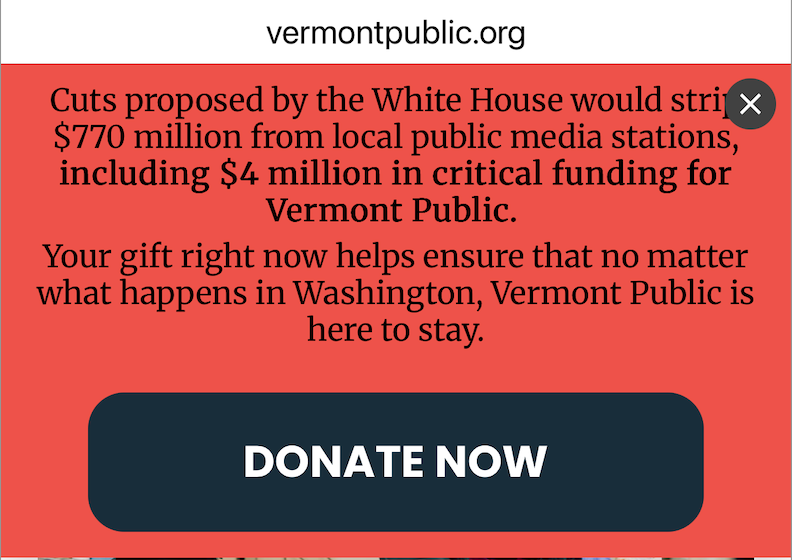Vermont Public Keys on Trump Cuts on First Day of Fundraiser
VPR estimates it receives approximately $2 million annually from the federally funded Corporation for Public Broadcasting, about 10% of its budget.
Vermont Public Radio (VPR) kicked off its June fundraiser today, urging listeners to donate in response to proposed federal funding cuts by President Donald Trump. The cuts, part of a $770 million reduction to public media nationwide, threaten $4 million in critical funding for VPR, prompting the station to rally community support to sustain its operations.
A Hurried Call to Action
VPR’s fundraiser, running through June 11, emphasizes the importance of listener contributions to counter the potential loss of federal funds. “We're asking you to step up and you can do something about this. You can support Vermont Public in all the services that we bring to you by giving a donation now.
However, the launch revealed internal confusion, with a volunteer noting, “I didn’t realize today was the first day of Vermont’s June fundraising. I didn’t hear anything on the radio about it prior to today.” This suggests the fundraiser’s timing may have been hastily arranged, reflecting the urgency of the funding threat.
Trump’s Proposed Cuts
The proposed cuts stem from an executive order signed by President Trump on May 2, 2025, directing the Corporation for Public Broadcasting (CPB) to cease funding NPR and PBS, including indirect support to local stations like VPR. The order, part of a $1.1 billion clawback over two years within a $9.4 billion package, targets CPB’s $535 million fiscal year 2025 allocation. Public media stations typically rely on CPB for 8-10% of their budgets, with PBS stations receiving up to 15% and NPR about 1% directly.
Impact on Vermont Public Radio
VPR estimates it receives approximately $2 million annually from CPB, about 10% of its budget, though the station’s fundraising notice claims a $4 million impact. Losing these funds could curtail educational programming, public safety communications, and local newsrooms, with rural stations at particular risk. In FY2024, VPR’s 38,859 donors and business sponsors contributed 58% of its funding, highlighting a strong community base but also underscoring the challenge of replacing federal support.
Broader Public Media Response
VPR is not alone in its response. Other public stations, including NPR and Colorado Public Radio, are taking action, with some filing lawsuits alleging First Amendment violations. Colorado’s KGNU is also discussing survival strategies, emphasizing community support. VPR’s coordination with Protect My Public Media, which urges listeners to contact Congress, suggests a concerted effort across the sector to combat the cuts.
Federal Process and Uncertainty
The cuts require congressional approval through a rescission process, but legal challenges and bipartisan support for public media could halt them. NPR, PBS, and local stations have filed lawsuits, arguing the cuts constitute viewpoint discrimination. Congress has historically supported public media, particularly for its role in rural areas, but the Trump administration’s aggressive stance creates uncertainty. A Pew Research study from March 2025 found Americans more likely to support than oppose continued funding for NPR and PBS.
Can Donations Bridge the Gap?
VPR’s reliance on donations, which accounted for 58% of its FY2024 budget, offers hope but no guarantees. Replacing $2 million in federal funds would require significant increases in contributions from existing donors and new supporters. Economic uncertainties and donor fatigue could complicate these efforts, though VPR’s history of community engagement suggests resilience.


